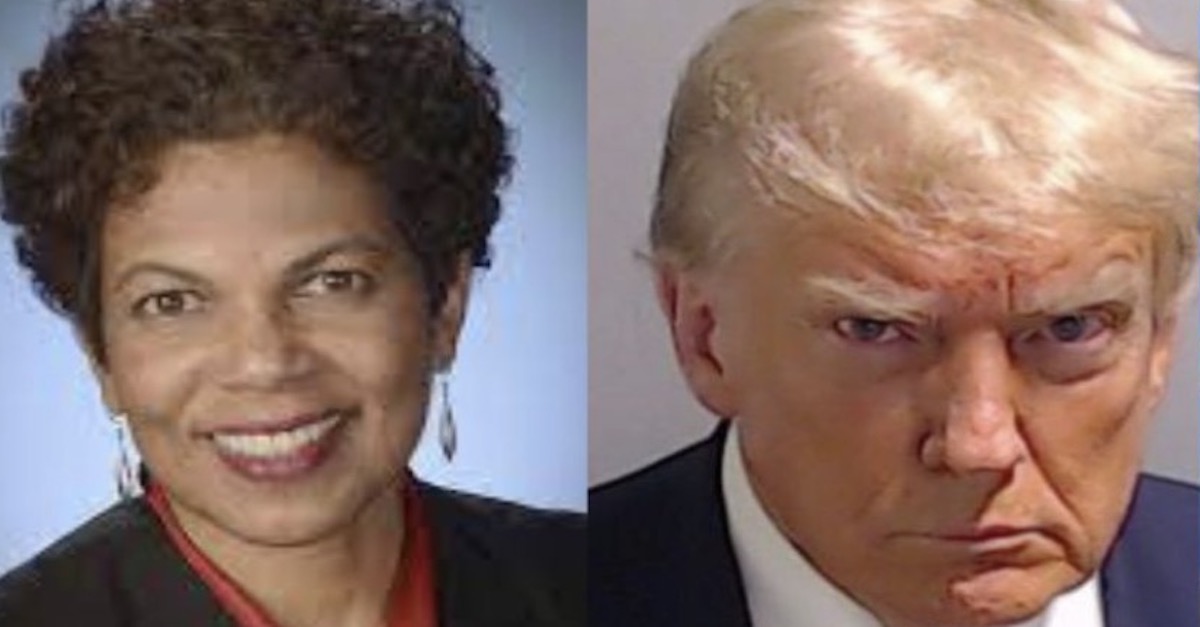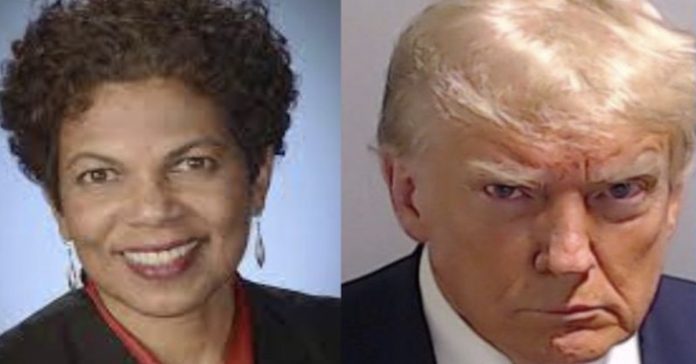
Tanya Chutkan (U.S. District Court photo); booking photo of Donald J. Trump, via Fulton County (Ga.)
A federal appeals court on Friday partially reinstated terms of an already-limited gag order placed on Donald Trump in his election subversion case in Washington, D.C., but not without first lashing him for giving “no inch to the need to protect the criminal justice system.”
The 68-page ruling from the U.S. Court of Appeals of the District of Columbia also orders that Trump and others in the case are forbidden from making public statements about any known or “reasonably foreseeable witnesses concerning their potential participation” in the investigation of Trump’s underlying indictment or the trial proceedings themselves.
Trump is barred too from making any comments about the parties to the case or their family members, except, rather notably, for special counsel Jack Smith.
In doing this, the three-judge panel mostly affirmed an earlier ruling from U.S. District Judge Tanya Chutkan, the federal judge presiding over Trump’s criminal conspiracy case in the lower court.
She had barred Trump from making any statements about potential witnesses, court staff or members of the prosecution.
“As written, the order prohibits interested parties from making or directing others to make any public statements that target — that are directed to or aimed at — prosecutors or court staff. That goes too far,” the panel wrote. “Prosecutors are vested with immense authority and discretion, including the power to take steps that can result in the persons’ loss of liberty. The public has a weight interest in ensuring that such power is exercised responsibly. And criminal defendants facing potential curtailments of liberty have especially strong interests in commenting, within reasonable bounds, on prosecutors’ use of their power,” the ruling states.
Therefore, speech on Smith should not be restricted.
But he isn’t entitled to speak without any mitigation.
Explaining the ruling, the appeals court needled Trump for his insistence that any restriction on his speech should be deemed improper or a violation of the First Amendment. They were especially critical of his take that a gag could only be placed on a defendant when the court can prove the speech presents a “clear and present danger.”
“First, Mr. Trump’s approach gives no inch to the need to protect the criminal justice process. He miscasts Supreme Court precedent discussing ‘clear and present danger’ as preventing the district court from doing anything at all to curb speech other than duplicate existing criminal prohibitions against influencing witnesses,” the appeals panel wrote on Friday. “Tellingly, Mr. Trump was unable to identify any example of speech that could be protectively proscribed by the district court that was not already a violation of the criminal law, and so also of his release condition to comply with applicable federal, state, and District laws.”
The record shows Trump has “repeatedly attacked those involved in this case through threatening public statements, as well as messaging daggered at likely witnesses and their testimony,” they noted.
Trump has a “unique megaphone” that is amplified by social media and therefore “ramps up the risk of public and press reactions” or other attention that could sway a witnesses’ participation in the trial, including altering their testimony, they found.
Further, the appeals panel wrote: “The risk is particularly significant that public statements about certain witnesses’ involvement in the case may intimidate other potential witnesses from providing testimony, encourage them to alter their testimony, or dissuade them from cooperating with investigators.”
Prosecutors first sought the gag order in October and a stay was placed on Nov. 3. At oral arguments when the matter went to appeal, the judges expressed skepticism.
Trump’s lawyer John Sauer argued that in order for any limitation on speech to be enforced, prosecutors would need to prove a “substantive evil” would occur if Trump was essentially left unchecked.
Sauer said special counsel had failed to factually prove there was a track record of Trump’s rhetoric leading to real world threats.
Not so, according to the Friday ruling from the appeals court.
The panel specifically noted that Trump’s lawyers “had not shown the factual finding to be clearly erroneous and we hold that the record amply supports it.”
The gag order has been a thorn in Trump’s side, his lawyers contend, as his political campaign for the White House muscles ahead. They have argued repeatedly since his indictment was first announced in August that the charges and any attempt to gag him would be hugely detrimental.
Chutkan told Trump’s lawyers this August that regardless of what was going on in Trump’s “day job,” this matter was a criminal case.
“The need for this to proceed in normal order and protect witnesses [and] the integrity of the process means there are going to be limits on the defendant’s speech,” she said.
The appeals court was inclined to agree.
“The existence of a political campaign or political speech does not alter the court’s historical commitment or obligation to ensure the fair administration of justice in criminal cases,” they wrote.
Courts, they added, are not “helpless to act until witnesses have been intimidated” or “violence has been attempted.”
Have a tip we should know? [email protected]

